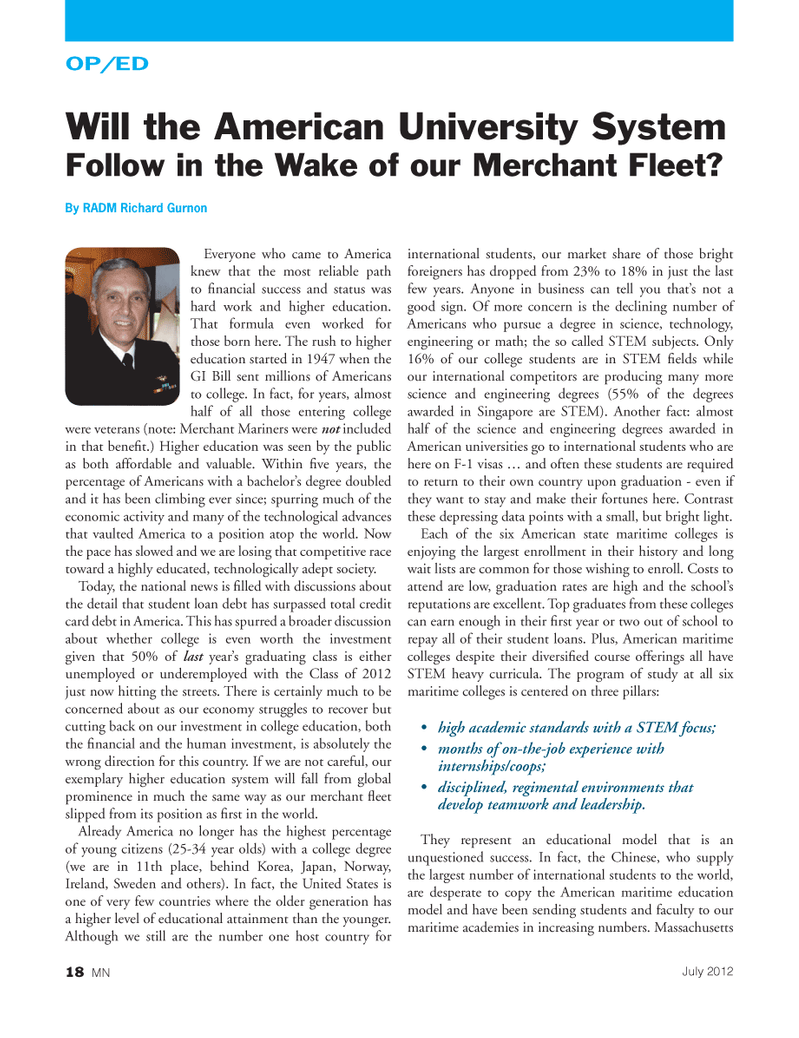
Page 18: of Marine News Magazine (July 2012)
Propulsion Technology
Read this page in Pdf, Flash or Html5 edition of July 2012 Marine News Magazine
OP/EDEveryone who came to America knew that the most reliable path to Þ nancial success and status was hard work and higher education. That formula even worked for those born here. The rush to higher education started in 1947 when the GI Bill sent millions of Americans to college. In fact, for years, almost half of all those entering college were veterans (note: Merchant Mariners were not included in that beneÞ t.) Higher education was seen by the public as both affordable and valuable. Within Þ ve years, the percentage of Americans with a bachelorÕs degree doubled and it has been climbing ever since; spurring much of the economic activity and many of the technological advances that vaulted America to a position atop the world. Now the pace has slowed and we are losing that competitive race toward a highly educated, technologically adept society. Today, the national news is Þ lled with discussions about the detail that student loan debt has surpassed total credit card debt in America. This has spurred a broader discussion about whether college is even worth the investment given that 50% of last yearÕs graduating class is either unemployed or underemployed with the Class of 2012 just now hitting the streets. There is certainly much to be concerned about as our economy struggles to recover but cutting back on our investment in college education, both the Þ nancial and the human investment, is absolutely the wrong direction for this country. If we are not careful, our exemplary higher education system will fall from global prominence in much the same way as our merchant ß eet slipped from its position as Þ rst in the world. Already America no longer has the highest percentage of young citizens (25-34 year olds) with a college degree (we are in 11th place, behind Korea, Japan, Norway, Ireland, Sweden and others). In fact, the United States is one of very few countries where the older generation has a higher level of educational attainment than the younger. Although we still are the number one host country for international students, our market share of those bright foreigners has dropped from 23% to 18% in just the last few years. Anyone in business can tell you thatÕs not a good sign. Of more concern is the declining number of Americans who pursue a degree in science, technology, engineering or math; the so called STEM subjects. Only 16% of our college students are in STEM Þ elds while our international competitors are producing many more science and engineering degrees (55% of the degrees awarded in Singapore are STEM). Another fact: almost half of the science and engineering degrees awarded in American universities go to international students who are here on F-1 visas É and often these students are required to return to their own country upon graduation - even if they want to stay and make their fortunes here. Contrast these depressing data points with a small, but bright light. Each of the six American state maritime colleges is enjoying the largest enrollment in their history and long wait lists are common for those wishing to enroll. Costs to attend are low, graduation rates are high and the schoolÕs reputations are excellent. Top graduates from these colleges can earn enough in their Þ rst year or two out of school to repay all of their student loans. Plus, American maritime colleges despite their diversiÞ ed course offerings all have STEM heavy curricula. The program of study at all six maritime colleges is centered on three pillars: high academic standards with a STEM focus; months of on-the-job experience with internships/coops; disciplined, regimental environments that develop teamwork and leadership. They represent an educational model that is an unquestioned success. In fact, the Chinese, who supply the largest number of international students to the world, are desperate to copy the American maritime education model and have been sending students and faculty to our maritime academies in increasing numbers. Massachusetts Will the American University System Follow in the Wake of our Merchant Fleet? By RADM Richard Gurnon 18 MNJuly 2012

 17
17

 19
19
